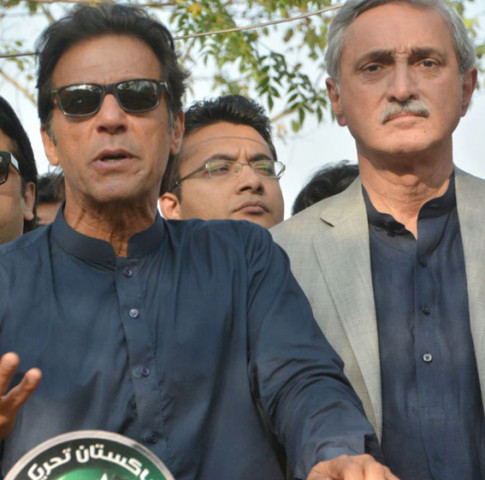Major blow: New election laws likely to drain PTI funds
Elections Act, 2017 bars parties from receiving funds from foreign sources, even overseas Pakistanis.

Akbar S Babar, a founding member of PTI and a one-time close associate of Imran Khan wants an audit of PTI’s accounts. PHOTO: MUDASSAR RAJA/EXPRESS
The party has a huge following among overseas Pakistanis who also constitute a major source of its funding. Once the new draft law is adopted, Imran Khan’s party would be deprived of this major source.
“Any contribution or donation made, directly or indirectly, by any foreign source, including any foreign government, multinational or public or private company, firm or professional association or individual shall be prohibited,” reads sub-clause 3 of clause 203 of the draft Elections Act, 2017.
K-P chapter: PTI workers demand intra-party elections
Akbar S Babar, a founding member of PTI and a one-time close associate of Imran Khan wants an audit of PTI’s accounts. In November 2017, he filed a petition in the Election Commission of Pakistan. In this case, ECP has sought documents including bank statements of PTI’s foreign bank accounts allegedly concealed by the party in statements of party accounts it has been filing every year with ECP.
Other allegations include PTI opened accounts of workers to receive donations from people living Middle East countries, mostly the Pakistanis working in these countries. Domestic laws in these countries bar funding to any political party. PTI used accounts of individuals to get these funds, according to the petitioner.
Another charge PTI is facing in this case is the alleged transmission of over three million dollars from two limited liability companies (LLCs) PTI had set up in US to generate funds. The existing laws allow a political party to receive funds from individuals living abroad, provided they are Pakistanis or they are of Pakistani origin. PTI through these two companies – PTI-NA LLC 597 and 6160 – registered with Department of Justice under US Foreign Agents Act allegedly received funds from different corporate entities owned by Pakistanis and non-Pakistan living in the US.
Moreover, PTI has party accounts in Britain and Australia and other Western countries where its supporters donate generously.
The case has lingered on for a long time mostly due to what the petitioner claims are PTI’s delaying tactics.
In December last year, the ECP passed a decree asking PTI to either submit relevant details or face legal consequences. The case will be taken up on February 21st once again. Given the challenge PTI is already facing in ECP on sources of funds in this case, and its numerical strength in parliament, it will be difficult for PTI to get the proposed clause barring every party from receiving any funds from abroad, omitted from proposed Election Act, 2017. And if adopted as proposed, the law would change the provision in Political Parties Ordinance, 2002 that allows a political party to generate funds through individual overseas Pakistanis.
PTI ready to join opposition grand alliance on Panamagate: Imran
The new law also ascribes a provision where the state can confiscate any such funds deemed to have been received through unsubscribed means. Sub-clause 4 of clause 203 says: “Any contribution which is prohibited under this Act, shall be confiscated in favour of the Government in such a manner as may be prescribed”. The new law defines foreign contributions as: a “contribution or donation” includes a contribution or donation made in cash, kind, stocks, transport, fuel and provisions of other such facilities.
Applicable to all the political parties registered with the ECP, the proposed law makes it binding upon every political party to keep a detailed record of any donation or contribution it receives from a member of supporter and provide ECP an audited copy of party accounts by August 29 every year. Never been regulated in the past, ECP had been publishing these statements without any further verification. It has recently set up a separate department tagged ‘political finance division’ at its central secretariat to audit statements of assets and liabilities lawmakers submit it every year and account details provided by political parties.
Published in The Express Tribune, January 27th, 2017.



















COMMENTS
Comments are moderated and generally will be posted if they are on-topic and not abusive.
For more information, please see our Comments FAQ